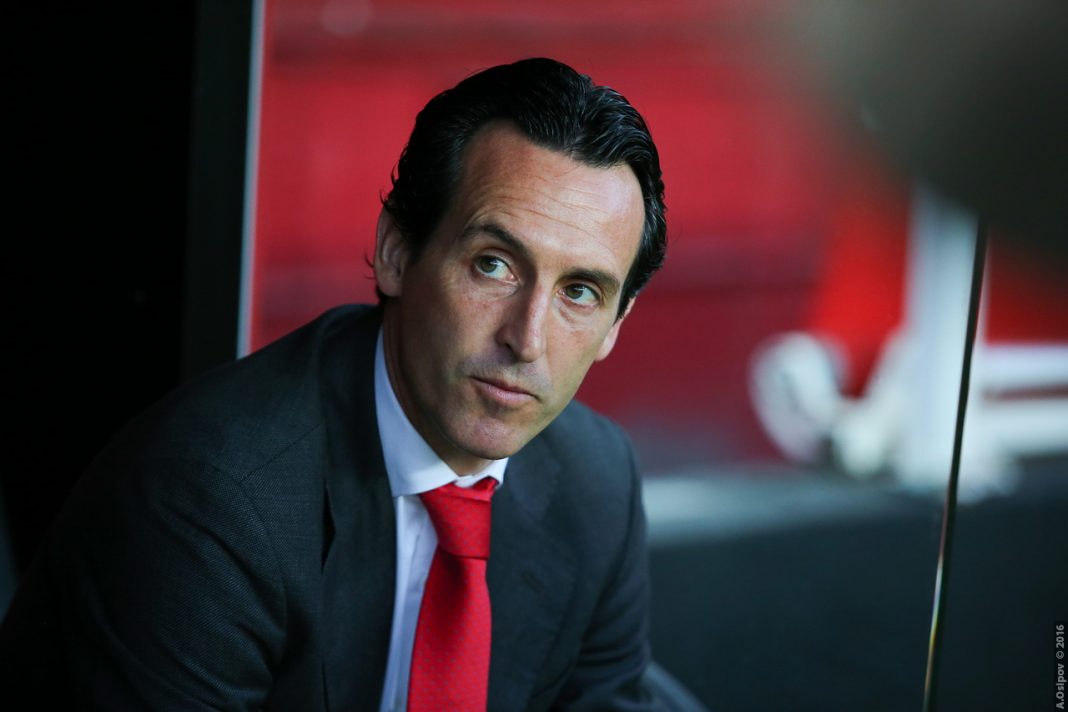Unai Emery’s reputation among Arsenal fans hasn’t exactly been enhanced since he left the club but let’s take a look back at why it might not have been a bad thing that he failed at Arsenal.
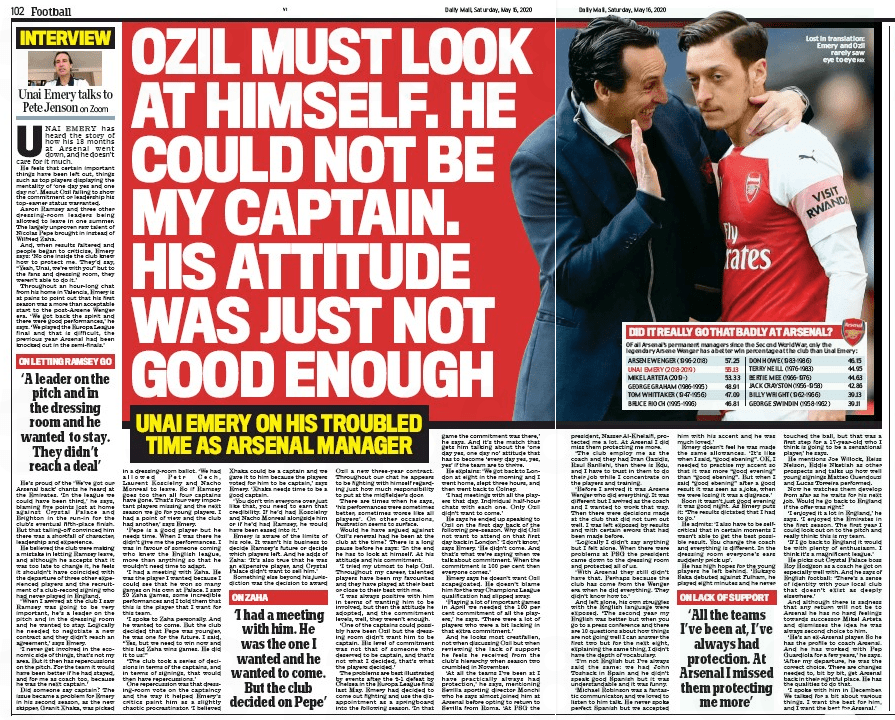
As Unai Emery gave interviews after leaving Arsenal, lots of Gooners leapt on quotes (both in and out of context) to paint him in a very negative light.
“Full of excuses”, “won’t take responsibility”, and “small time” are among the more regular comments.
However, as usual, it’s not quite as simple as that, and its worth looking beneath the surface.
Unai Emery – Short-term from the start
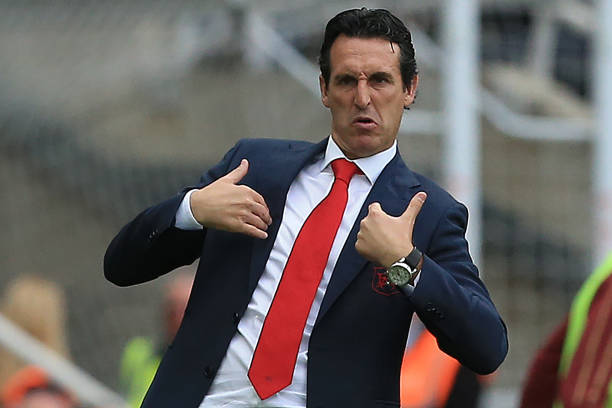
Right from the get go, Emery seemed a short-term appointment.
Never likely to be the visionary type we had been accustomed to in Wenger, nor the iron-fisted ex-playing hero like George Graham, the odour of Bruce Rioch was strong in the air.
But it is easily forgotten that, on balance, Rioch was a good thing for Arsenal. Aided by new stars Bergkamp and, to a degree, Platt, he helped coax the team out of the joyless grind-fests of the latter days of gorgeous George. While hardly on Wenger’s level in terms of attacking ambition, he helped add some bravery and creativity to a group who’s potential for adventure had been slowly suffocated by Graham’s tactics, casting the free-flowing football of 1990 to 1992 a wistful memory.
Under Rioch, the football improved and so did the results.
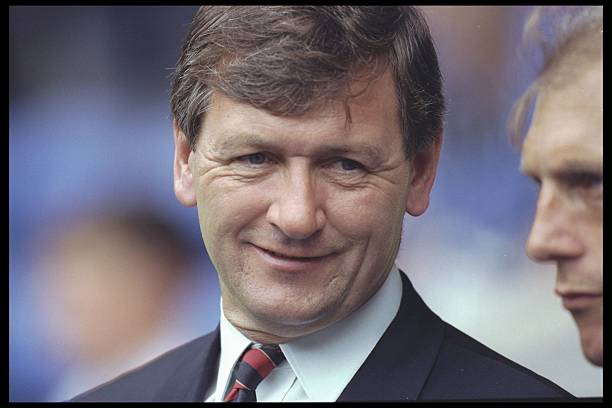
Ultimately, Rioch’s inflexible approach rubbed certain players up the wrong way, most notably Ian Wright who was moved to submit a transfer request,and when combined with his inability to carry himself in ‘The Arsenal Style’, his tenure was doomed to be limited.
When Wenger became available, the axe fell, but Rioch had done a useful transition job, and most fans were surprised when he was let go, even before we found out ‘who?’ was replacing him.
As it turned out, the usefulness of Rioch’s time in charge was augmented by its brevity.
Fast forward 22 years, and Arsenal once again found itself a club in transition, and in need of re-orientation.
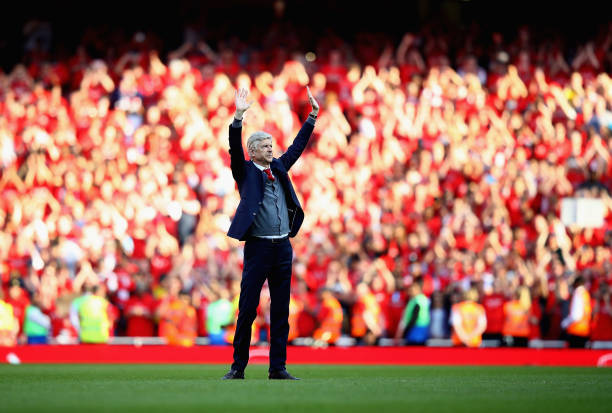
Still in the midst of the whirlwind of seismic change, the club ultimately decided to prioritise a steady pair of hands to help the post Wenger transition. With the club undergoing massive structural changes, and rot clearly having set in on the playing side, the decision was taken not to be too adventurous.
With an infamous work ethic and attention to detail, a reputation for tactical flexibility and a newly relevant excellent track record in the Europa League, Emery ticked a lot of immediate boxes.
His lack of public facing charisma, difficulty in controlling egos and his perceived under-achievement at PSG gave pause for thought, but it was really his favouring of pragmatism over long-term vision that made him look like a head coach for a good time rather than a long time.
Unai Emery – Limited from the start
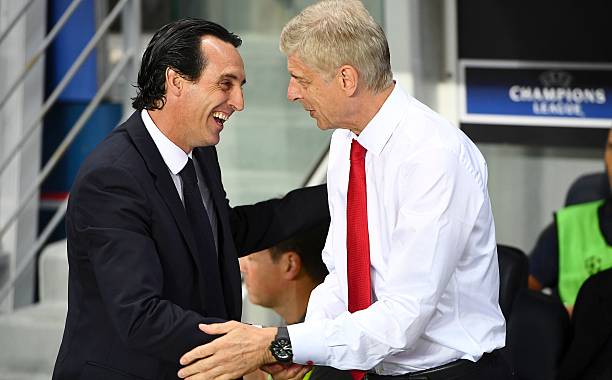
One problem always likely to limit Emery’s staying power was we expect more than just a ‘head coach’ at Arsenal.
Like it or not, just as with the club, most of us Arsenal fans have been at least partially Wenger-ised. As with football, the way we interact with and consume it as an experience has changed over the last 30 years, so our expectations have been re-calibrated. The imprint left by our ‘greatest post-war manager’ is intimately interwoven with that change, as he was a constant for most of the period in question.
Paying £4 to stand on Highbury terraces, watching local lads you could bump into in the pub afterwards and maybe also catching the four or five games a season shown on telly (in some parts of the world only) makes the fan experience less transactional and more communal. It gives one a greater sense of belonging, but perhaps less of a one of ownership.
When your only media consumption is via the back pages of newspapers and the only ‘breaking news’ is on ceefax or teletext (ask yer da’), the connection with the club is either being there or imagining being there. Just like church, you don’t have to believe in or enjoy the sermon to feel part of the bigger family.
Now, things are rather different. It’s 24 hour rolling news updates. We can (usually) watch football in every waking moment. The internet tells us what reserve players like for breakfast and what 16-year-old in Guatemala we should be buying. The games can cost a day’s wages to attend and you can work out what proportion of that ticket money is going where.
We are more widely invested. We HAVE invested. We are over-informed and often lack understanding. We know the third choice goalkeeper earns more in a week than we do in a year, and we can rattle on about inverted wing backs, deep-lying playmakers and the death of the number 10.
Accordingly, we expect more.
We don’t want to just accept being told less then we already know when we’ve subscribed to a service that costs £xxx a month to hear it, and can find detailed analysis of almost everything from a hundred YouTube channels.
Then you add Wenger on top.
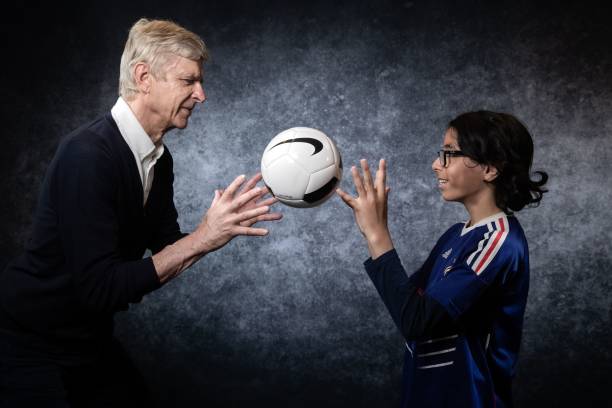
Charm, humour, sophistication and intelligence added up to a figurehead who could, when the going was good, sell you sand in a desert. He was always subtly offering us dreams, ideals, experiments, and tantalising possibilities, backed up by record breaking achievements and fortified by mutual expressions of love.
That intoxicating combination had defined our new relationship, and became the baseline expectation to fall back on when on-field matters left us dissatisfied.
Eventually, the beloved spiritual leader became the overly centralising benevolent dictator, and slowly the emperor’s wardrobe deficiencies were laid bare before our ever increasing scrutiny. So, collectively, we forced the abdication, felt relief when it came, and wrestled with our guilt when it came time to say goodbye.
Into this vacuum of power and faith walked the humble, earnest, technocratic head coach, Unai, comfortable with the boxed-in role he was granted and willing to work like a dog to restore both the club and his international reputation.
For contrast as much as anything else, even the doubters welcomed the change.
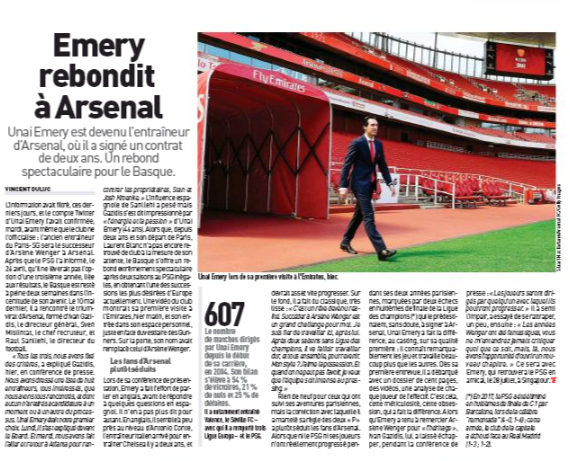
At first, Emery’s use of slightly broken, jargon-ey English was seen as bravery, with the assumption that improvement would be swift. The promise of hard work was a welcome antidote to the indiscipline that had crept in at the club. His reputation for tactical tinkering a welcome change to the predictable and inflexible. To top it off, he was attached to the new shiny and modern three-pronged leadership structure of Diamond-Eyes Sven, contacts man Raul, and Mr Catalyst-for-change himself, Ivan.
A brave new world?
In addition, Arsenal’s poorly constructed squad had been augmented by new signings, a mix of the prosaic and the promising, and a new found attention to positional need.
We suddenly had tackling midfielders!
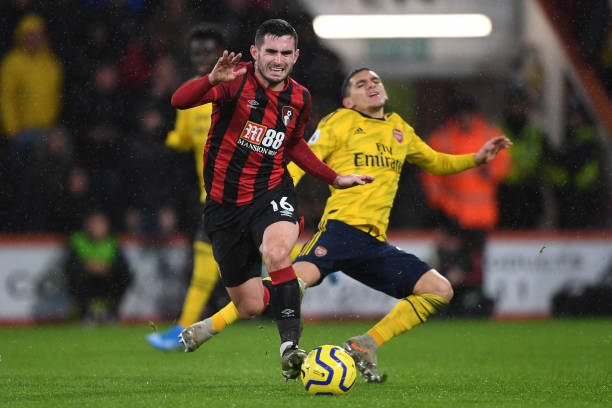
Mixed results early on didn’t belie a greater work ethic, relative tactical innovations and the development of younger squad members. In that early, tenuous unbeaten run, there were moments when Wengerball beauty and Emeryball energy fused excitingly. Fleetingly, the feeling was indeed that “we’ve got our Arsenal back”.
But slowly, even before the early spring stuttering, let alone the late season car crash, there was evidence of cracks. And inevitably, questions followed.
Despite good results, the advanced stats we all now have at our fingertips confirmed the feeling that performances showed the good form was not sustainable.
Was this a new found efficiency or was this a house being constructed on sand?
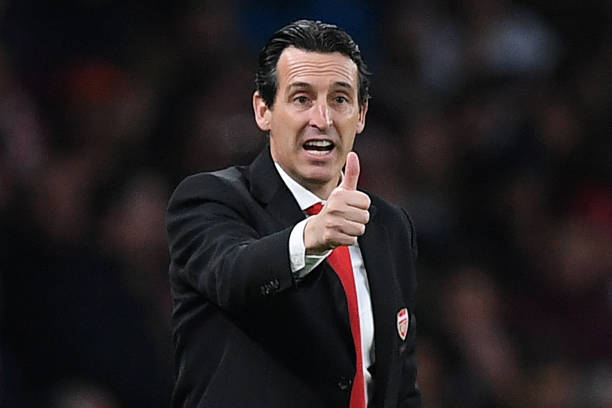
In spite of the goal scoring exploits of our up front bromance, possession levels and risk taking appeared to be on the wane. A temporary focus on defensive stability or inherent over-conservatism?
Whether encouraged by the board or not, overtly freezing out the likes of Ramsey and then Ozil from a team short on creativity was not a politically sensitive move. Even less so when both returned to regular action undaunted by their experience on the fringes.
Was this discipline in action or was this weakness and indecisiveness?

The initially endearing ‘Good Ebening’ and the politeness and respect it carried lost its charm a little when it was followed by press conferences that seemed increasingly opaque. Keeping cards close to his chest or a communication weakness?
These concerns and questions can be put aside when things are going well, but just like an ill-advised teenage tweet, never fully go away.
Ultimately, even the vaguest sense of ‘not quite right’ came into sharp focus during the league run-in and about an hour into the Europa League final. The wheels had come off in a way not even latter-day Wenger had ever suffered.

That run exposed the weaknesses of the squad, the lack of mental fortitude pervading through the club and the tactical uncertainty of the coach in quite stark fashion. Add into the mix the acrimonious refusal to travel and departure of long serving club captain Laurent Koscielny, and the sense of unravelling was unavoidable.
It didn’t help that the board, still establishing its latest status quo, kept tight lipped. With so little credit in the bank, none of the key players at executive level wanted to stick their heads above the parapet until they had something good to say. Emery was not a charm offensive expert to soften the blows a la Arsene, and largely kept his council, feeling the job to soothe the fans lay upstairs.
He was only the head coach, after all.
Our disappointment and desire to have something to believe in going forward was met with silence.
This meant there was no alleviation of the cloud of disenchantment that had descended. Inevitably this connected with other dissatisfactions, resulting in the ‘we care, do you?’ movement, and, ultimately, the moment where Josh Kroenke announced himself as ‘the man’ by facing up to the storm (albeit in a safe corporate way), and promising action. We remained unplacated.
And then Pepe arrived.
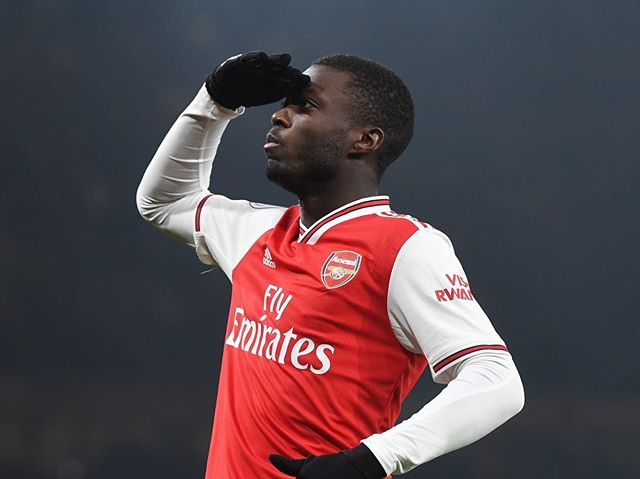
A statement of intent from club and board. A sort of making good on Josh Kroenke’s earlier promise, and a source of much excitement and optimism. Pepe was also a player who stylistically addressed a problem area on the pitch for the coach.
But as was suspected at the time, he was not the one the coach really wanted.
Pepe was a long-term thinking signing who had never played a day in England, and had only really performed at the top level for 18 months. Understandably, Emery was rather keener on Zaha, who promised more immediate impact, and would have rather more in keeping with a coach brought in to achieve short-term aims.
With promising arrivals, as is the want of football fans, there were attempts to draw positives from Emery’s first season as a whole. What could give us optimism beyond the board’s investment?
Progress with younger players had been encouraging, but each balloon had a puncture.
Holding and Bellerin had kicked on significantly. Unfortunately, both sustained massive career stalling injuries. Likewise, Iwobi had been very effective for the first half of the season – but he was now at Everton. Maitland-Niles had taken a step forward but was still out of position. We had seen glimpses from Willock and Nketiah, and on loan youngsters Nelson and Smith-Rowe, but were any ready to step up?
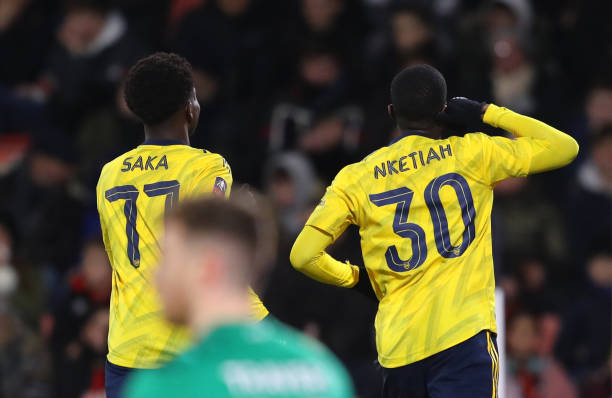
The goalscoring exploits and bromance of Auba and Laca had been a great success until the last few games, and a source of enjoyment around the camp. On the flip side, we were creating less chances as a team and goalscoring elsewhere was poor.
There was definitely something to be said for the improved competitiveness in ‘big’ games, but ultimately, this deserted the team when it mattered most.
Accordingly, as fans we approached the new season with curiosity, our hope tempered by the emotional scarring of April and May. Certainly, pre-season had positive signs, with the re-integration of an enthused looking Ozil, a return to 4-2-3-1, and positive showings from the kids on the fringes. The sudden departures of Monreal and Mikhitaryan were confusing, but seemed strategic decisions rather than coaching ones.
The first few fixtures gave room for cautious optimism despite more stilted displays.
Then came the 2-2 draw at bottom of the table Watford.
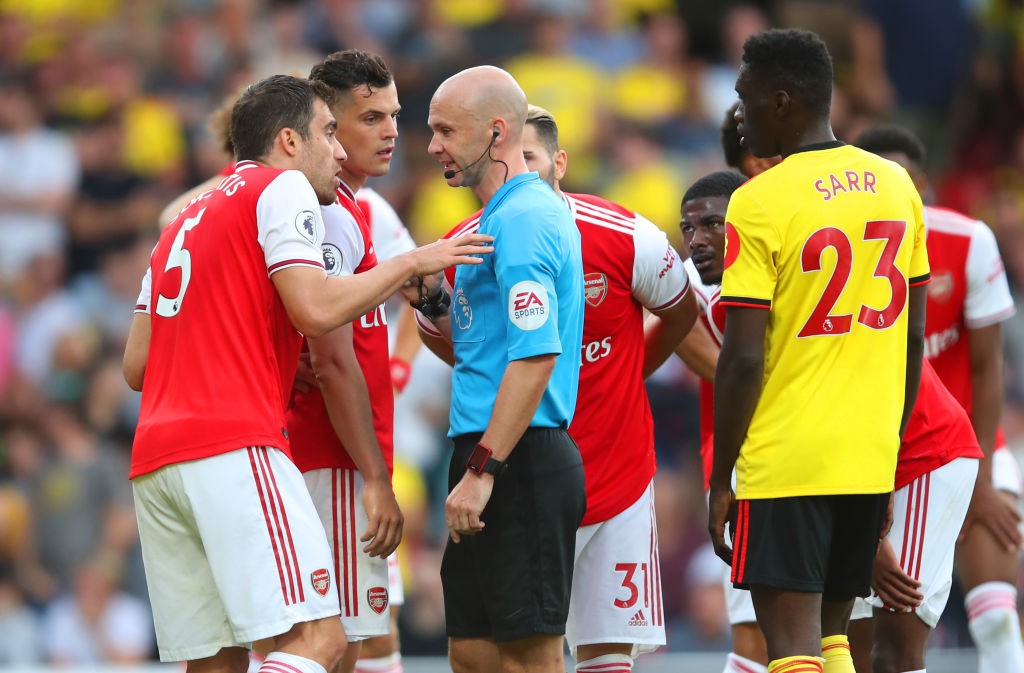
A comfortable cruise control first half was followed by a truly traumatic second, in which Arsenal were extremely lucky to only concede two. It was perhaps the most truly alarming performance under Emery to date and a harbinger of what was to follow.
Narrow wins over Villa and Bournemouth at home and a draw at a totally dysfunctional Man United showed plenty of effort but no cohesion, and pointed towards the terrible league run that followed. As ever, Emery’s magic touch in the Europa League was a bright spot, but as October rolled into November, even that brightness dimmed.
Ultimately, a run of one win in eight games from late October, culminating in 2-1 home defeat against Eintracht Frankfurt in Emery’s specialist competition did for our first Spanish head coach.
At least, that’s what the record books will show.
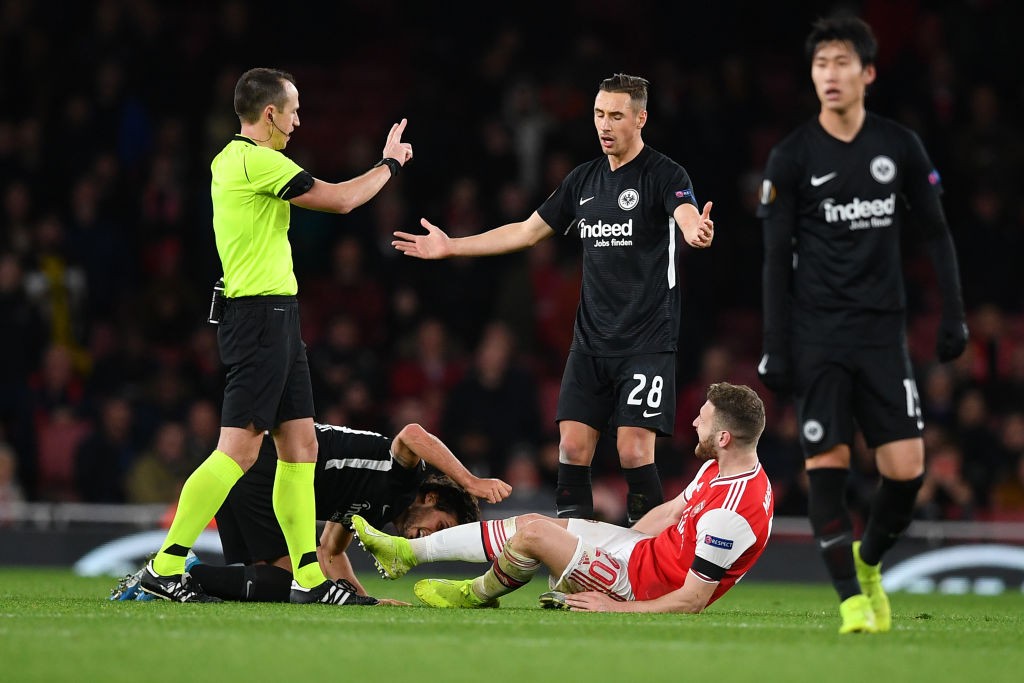
However, that is only part of the puzzle.
Results and underlying metrics under caretaker Ljungberg and current incumbent Arteta are not wildly different to all but the last few games of Emery, but the ‘feel’ is so very different.
Of course, it helps that Ljungberg and Arteta both have significant history with the club, but that only buys a little initial grace.
As I said before, we are both more analytically sophisticated as fans and require more off the pitch from our coaches than in decades past. But we are also just as able to sense atmosphere and be influenced by emotion as any fans since the club was born.
With Emery the defeats were only part of the issue. It was the manner of them, and the manner they were responded to.
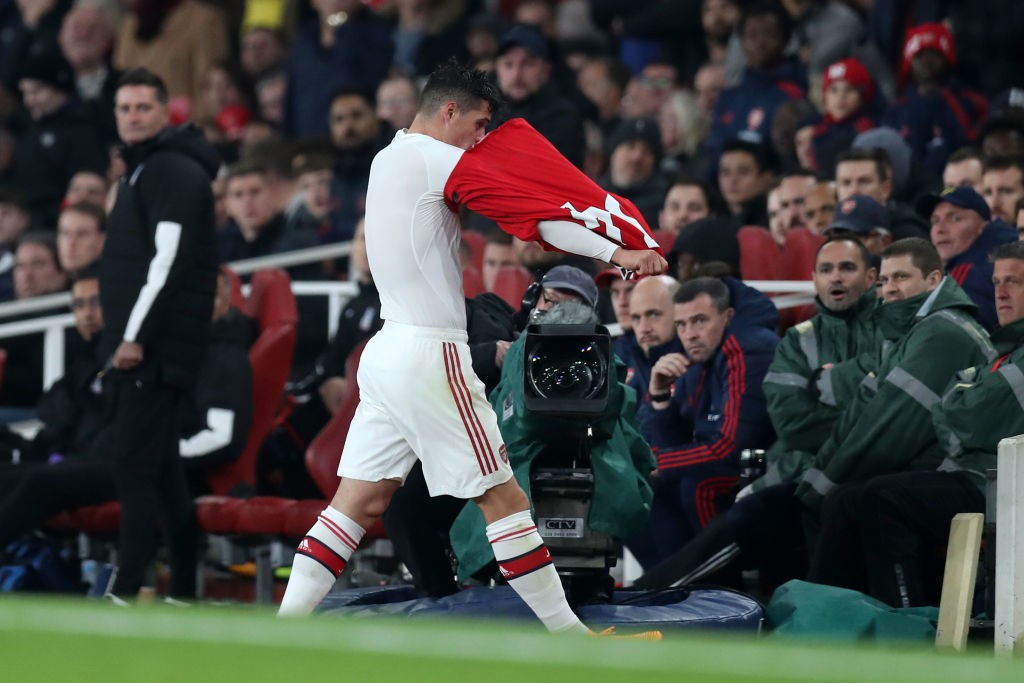
In the final days of Wenger’s time in charge, it was clear to see that the effort and discipline was on the wane. This was something else. Until those last couple of games, the players were still trying as much as ever, but it became increasingly clear that they either didn’t know or didn’t believe (or both) in what Emery was asking them to do.
As fans, we had reached the same point. Attempting to analyse the games had become a farce as the team was so lacking in structures, cohesion and tactical consistency. It appeared increasingly that the coach was ‘trying things’ rather than cementing some kind of central underlying structure.
People, in any walk of life, want touchstones or points of secure knowledge to use as markers on their journey. If one can understand where they are and their direction of travel, no matter how distant the destination, it’s amazing how resilient they can be.
Instead, the team looked broken and bewildered. As fans we felt much the same way.
Many fans, myself included, had never experienced this before.
George Graham had built a lot of credit in the bank, and, even at the end, I could identify a template, no matter how dour.
Bruce Rioch was ushered out the door before the wheels could fall off his bus, and Arsene Wenger’s teams, no matter how porous and jazz-fusion improvised, always had the sense of excitement and possibility about them, and certain ideals behind them. When Wenger’s teams finally stopped representing the vision he espoused, his time was up. Not because we rejected that vision, but because that vision wasn’t even close to being realised any more.
With Emery, by the end we couldn’t make sense of what the team was doing on the pitch, and he’d never been able to communicate what he wanted that team to be.
We’d heard words like ‘protagonists’, ‘hard work’ and ‘energy’, but those are just components.
The old Indian parable of ‘The Blind Men and The Elephant’ springs to mind.
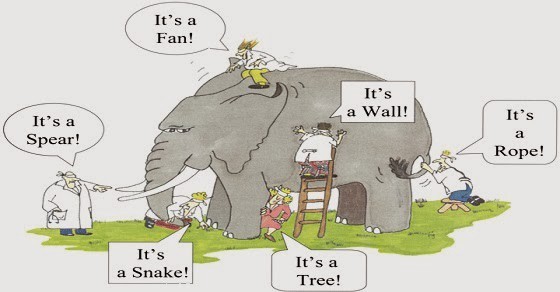
Without a bigger picture, individual elements lose their meaning. Modern fans, even without the two decade history of the archetypal ‘story-teller manager’, need to feel like they know what they are supposed to be seeing.
After all, what is tribalism without identity?
Was it that Emery couldn’t communicate his ambitions for the team? Or was it that he didn’t really feel that was part of his role?
We must remember that Emery was not brought in as club manager. He was a head coach, happy to be a head coach, and happy to defer to his superiors. He couldn’t dictate signings or sales, and his influence was strictly limited to matters of the first team training, tactics and match-day implementation.
After Arsene Wenger, the club (and one presumes Gazidis in particular) did not want another man coming in and taking so much ownership.
Of course, that’s the way Emery had always worked. He’s a head coach.
Sure, it helps if you can have a relationship with a Director of Football like he had with Monchi at Sevilla, but, essentially, his job was to take what he was given, and try to make the best of it.
Its instructive that he talked when interviewed about not feeling protected or supported in the same way he was at other clubs, and as alone.
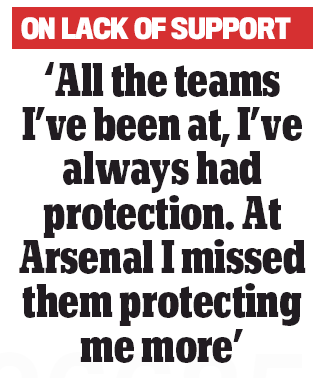
Whether you think it excuses his failings or not, he’s certainly being truthful.
He was brought into a club trying to transform itself from a 20th Century British structure to a 21st Century European / North American one. A structure that already ceased to exist before the ill-fated end to his first season and still isn’t entirely consolidated in its new form.
He was also trying to adapt to the English Football culture that doesn’t care what your official job title is. If you are in charge of the team, you are the figurehead, even if you don’t have the power. He’d had a taste of this is France, but at PSG, everyone knew who the bosses were. Nasser Al-Khelafi and Neymar, as Emery readily admitted, to his detriment.
It’s no surprise that much of what has made Mikel Arteta compare so favourably is his force of will and assumption of control.

The new Arsenal manager understands the club, the fans and English football culture, and realises how important giving the fans something to buy into is for the role of the ‘head coach’ at a club like Arsenal.
One also gets the impression that the club have been very willing to let Arteta impose his expectations beyond just the confines of the First Team squad. Ultimately, while the support structures and prevention of managerial megalomania are all in place, Arsenal now have an operational model that is much more of a hybrid of the two states it was shifting between post Wenger.
Arteta may not have the breadth and depth of Wenger’s power, but in terms of public perception, he is undoubtedly the boss.
Perhaps it took Arsenal as a club and Arsenal fans to endure the Unai Emery experience to realise what they wanted and needed.
Emery is a loyal, hard-working, respectful company man who works best within limited scope at a club whose sense of identity is less dependent on the leadership of the Head Coach.
Arsenal are not that club and were not going to become that club overnight.
Much of the talk around the time of Emery’s hiring was of moving to a more Chelsea like model of guns for hire who have two or three years and then move on. It was seen as the future.
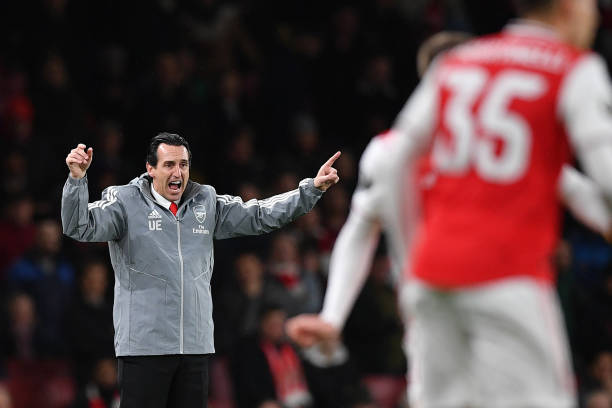
But Arsenal, more than most, is a club of traditions. A club whose identity is always most comfortable linked to its pioneering past, and more comfortable with long-term consistency.
If you exclude caretaker managers holding the fort, Arsenal have had only 15 managers in the last century. 10 (including Arteta) were ‘Arsenal Men’, who, in one role or another, had a significant connection with the club.
Of the five ‘outsiders’, two were undoubtedly visionaries who changed English football in Herbert Chapman and Arsene Wenger.
The other three? Billy Wright, Bruce Rioch and Unai Emery.
All left under a cloud and for one reason or another didn’t quite fit. The first two certainly played their part. Wright instituted the youth movement that underpinned the 1971 double.
Rioch helped the transition to Wengerball and the integration of Dennis Bergkamp.
With the rapid squad turnover and influx of the best crop of youngsters at the club since the mid 1980s, will we reflect similarly on Unai Emery in years to come?
A bad fit, never likely to stick around, but a useful stepping stone?

